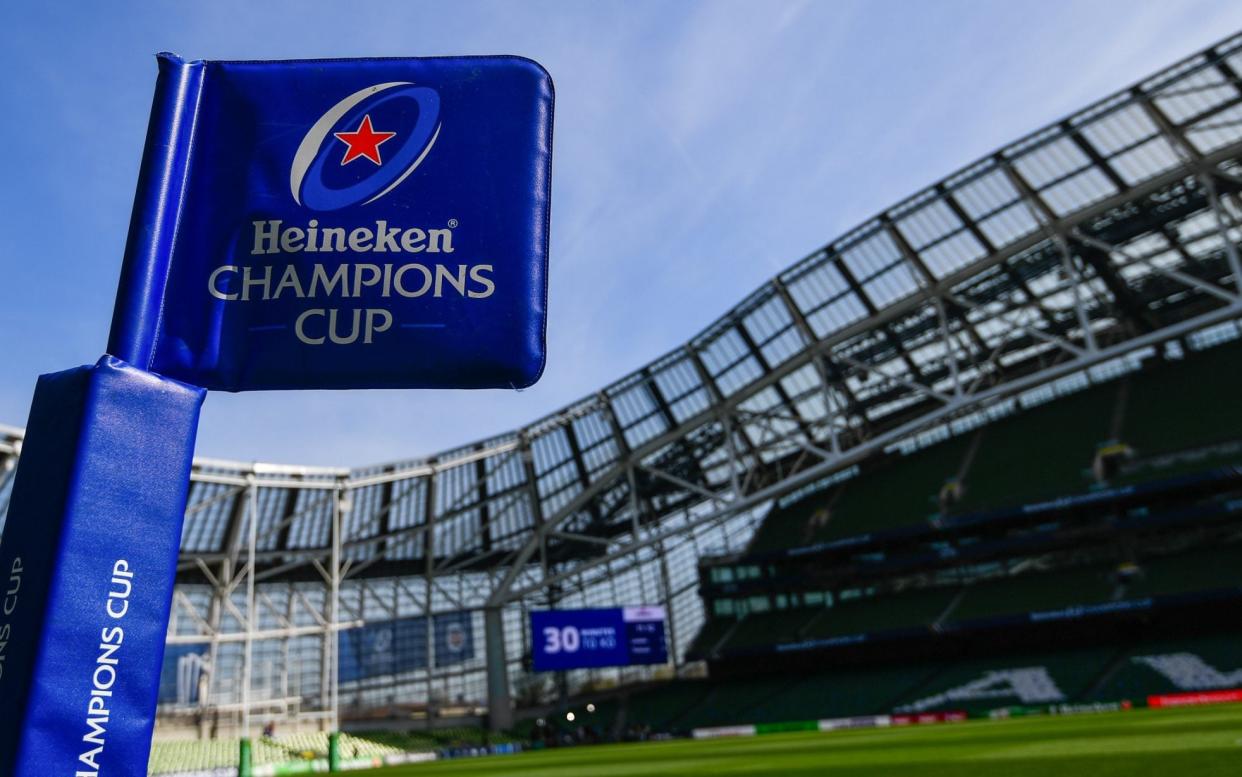Champions Cup set for pool stages overhaul

The Champions Cup pool stages are set to be streamlined as soon as next season with the emphasis on making them easier to understand and matches more intense.
The move follows feedback from supporters and players. The tournament's current layout sees the top eight teams from two pools of 12 qualify for the last 16. First introduced in 2020 as part of a revised format after the original group stage was cancelled due to Covid-19, it has since been retained over the past two seasons.
However the pool stage fixtures, which see teams play two sides twice home and away, have received criticism from fans and pundits for being difficult to understand and lacking intensity.
"We would like to have an improvement as early as we can," said Dominic McKay, European Professional Club Rugby's chairman on Tuesday. "It's possible we could see some improvements next season, but it's a bit too soon to make a commitment on that. The feedback has been there's a keenness to try and evolve it.
Insisting that the governing body were looking at the format "thoughtfully and deeply", he added: "I'm on record about the pools that we've enjoyed over many years. One of the things people are interested in that we don't lose sight of is the readability and clarity around the format itself. That's really important to us - that we have a format that everyone understands, is very clear to articulate, is exciting, and every game meaningful. Sometimes improvements can be as a result of looking backwards."
Speaking as EPCR launched a new sustainability strategy, with a plan for the EPCR Finals weekend to be carbon net zero by 2030, McKay added that hosting a Champions Cup final in South Africa was a possibility in the coming years, with EPCR listening to bids to host the 2025 and 2026 finals this summer potentially from outside of the existing nations participating in the competition, having previously taken the 2018 Champions Cup final to Bilbao in Spain.
"Instinctively, we want to try and keep that in our existing territories and potentially South Africa," McKay added. "But if the right option came in that worked for our stakeholders and our leagues, we would be open-minded to that. [2025 and 2026] possibly might be too soon [for South Africa], but it depends on the quality of bids that we get."
Telegraph Sport's rugby experts suggest how they would try and restore the Champions Cup to its former glory.
Gavin Mairs: Move to four pools
The move to two pools of 12 has bemused supporters and players alike - and critically diluted the sense of jeopardy during the qualifying round.
If the tournament is going to regain its prestige, a return to the traditional pool format and reduction in the number of teams to 16 will be key.
Four pools of four featuring the 16 best sides in Europe. In this case less will definitely be more, and give the tournament more time to breathe in an already crowded fixture list.
Charlie Morgan: Have fewer teams
Some criticism of the Champions Cup has come from detractors wearing rose-tinted spectacles suffering from selective amnesia about the vulnerabilities of the previous format. But there is certainly a case for slimming down the top-tier competition, because it feels bloated. Allowing the eighth-ranked Premiership side to compete with the previous season’s winners of the Top 14 or United Rugby Championship is a waste of time and fans have become disinterested.
Organisers cannot legislate for factors such as how teams change during off-seasons – losing their head coaches or star players, for instance – or whether teams decide to prioritise their domestic league after becoming embroiled in a battle for the play-offs or a relegation scrap.
To keep the Champions Cup as an elite competition, though, they should reduce the number of contestants. A field of 16 could include five from each of the Premiership, the Top 14 and the URC, plus the Challenge Cup winner of the prior season. While divvying out national representation from the URC may remain a thorny issue, it must be kept in mind that the tournament has to reward domestic success.

Ben Coles: Fines for weak selections
Player workloads have to be managed, unquestionably, but if a side makes 13 changes (as Gloucester did in round two) or rests their frontline players during the opening two rounds debuting in the competition (Bulls) then instantly as a neutral your brain switches off and interest wanes.
As a result, Gloucester and the Bulls were collectively beaten 101-14 in the second weekend of the tournament. Neither game was a contest. Only the diehards would have tuned in.
You can’t blame Gloucester’s George Skivington or the Bulls’ Jake White. Why, if there were no repercussions, wouldn’t you opt to rest a number of starters for tricky away trips in Europe ahead of important domestic fixtures the following week?
Europe is supposed to be the pinnacle. Perhaps the time has come to remind teams of that by introducing a point(s) deduction or small fines if they make double-digit team changes or notably omit available internationals. The weaker the selections, the quicker people switch off.
Charles Richardson: Reinstall double-headers
Everything that we loved about this once-great competition has been slowly but surely taken away from us. The disappearance - due to the new, discombobulating format - of back-to-back double-headers is a case in point. These matches, usually played in Christmas and January, featured some of the competition's most iconic tussles.
One team being stung at home, suffering a comprehensive loss on an off-day, before unexpectedly turning the tables five days later provided depth and layers of drama and intrigue with which today's tournament simply cannot compete. They were essential for building and maintaining camaraderie between different sets of supporters, too.

 Yahoo News
Yahoo News 
